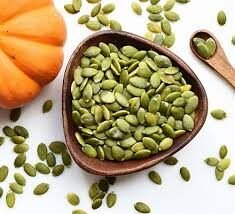The Benefits of Pumpkin Seeds
Pumpkin seeds are a nutrient-rich food that has been linked to a number of health benefits. They are a good source of protein, fiber, and healthy fats, and they also contain a number of vitamins and minerals, including magnesium, zinc, and phosphorus.
Here are some of the health benefits of pumpkin seed:
- Improved heart health: Pumpkin seeds are a good source of magnesium, which is a mineral that helps to regulate blood pressure. They are also a good source of fiber, which can help to lower cholesterol levels.
- Reduced risk of cancer: Pumpkin seeds contain a number of antioxidants, which can help to protect cells from damage. Some studies have shown that pumpkin seeds may help to reduce the risk of certain types of cancer, such as prostate cancer and breast cancer.
- Improved prostate health: Pumpkin seeds are a good source of zinc, which is a mineral that is important for prostate health. Some studies have shown that pumpkin seeds may help to improve symptoms of prostate problems, such as prostate enlargement and prostatitis.
- Improved fertility: Pumpkin seeds are a good source of zinc, which is a mineral that is important for male fertility. Some studies have shown that pumpkin seeds may help to improve sperm quality and motility.
- Improved sleep quality: Pumpkin seeds contain a compound called tryptophan, which is a precursor to serotonin, a neurotransmitter that helps to regulate sleep. Some studies have shown that pumpkin seeds may help to improve sleep quality.
How to eat pumpkin seeds:
Pumpkin seeds can be eaten raw, roasted, or cooked. They can be added to salads, yogurt, oatmeal, or other dishes. They can also be made into a snack by roasting them with a little bit of oil and salt.
How much pumpkin seeds should you eat?
The recommended daily intake of pumpkin seeds is about 1 ounce (28 grams). However, you may want to eat more or less depending on your individual needs and preferences.
Are there any side effects of eating pumpkin seeds?
Pumpkin seeds are generally safe for most people to eat. However, some people may experience allergic reactions to pumpkin seeds. If you have an allergy to pumpkin seeds, you should avoid eating them.
Conclusion:
Pumpkin seeds are a healthy and nutritious food that can be enjoyed by people of all ages. They are a good source of protein, fiber, and healthy fats, and they also contain a number of vitamins and minerals. Pumpkin seeds have been linked to a number of health benefits, including improved heart health, reduced risk of cancer, improved prostate health, improved fertility, and improved sleep quality.
We hope above article will help our readers are now aware about the benefits of pumpkin seed eating on daily basis.
Thanks for visiting our website Gymbag4u.com
Our readers may also like our following articles on Chia seeds benefit and side effects to health – (gymbag4u.com) and Flax seed consumption health benefits and side effects – (gymbag4u.com)
